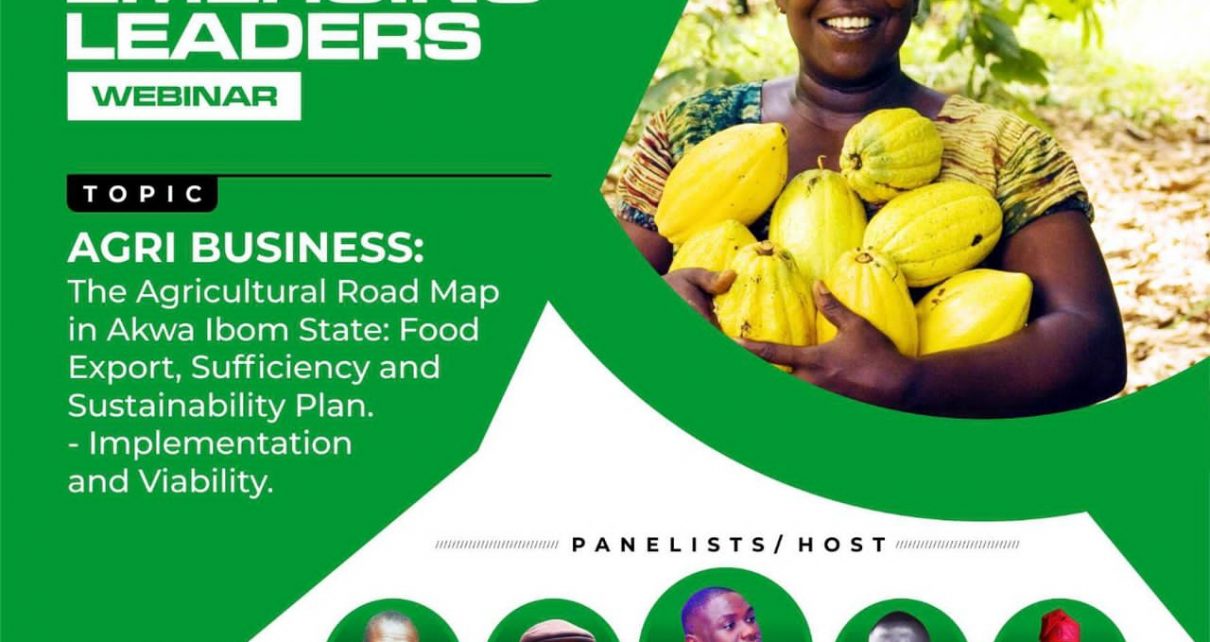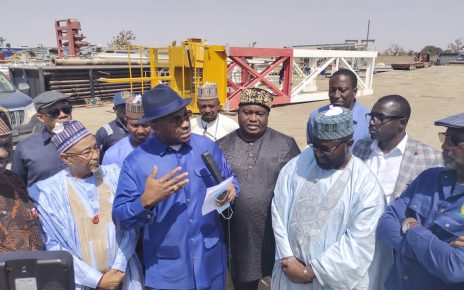By UKPONG UKPONG
Emerging Leaders of Akwa Ibom State have picked interest in promoting agriculture as a pivot for industrialization and economic growth. Encouraged by Governor Umo Eno’s promise to build an agrobased industrial economy, they have initiated conversations on the viability and sustainability of adopting agroenterprise as a vehicle for socioeconomic change. Recently, I was privileged to present my thoughts during one of such discussions – a webinar on Google meet titled ” AGRIBUSINESS: The Agricultural Roadmap in Akwa Ibom State: Food export, Sufficiency and Sustainability plan – implementation and viability”. Interaction afterwards was quite engaging and intense. Nothing less was expected from young Akwa Ibom professionals living in Nigeria and abroad.
In my vocation as an agroenterprise trainer, I’m aware that our youths are intelligent and industrious. They are willing to engage if given required tools and support. It was therefore not surprising how the gist flowed as we cross-fertilized ideas on topics ranging from the state’s land mass, availability of space for crop and livestock production, utilization of our water bodies, investment in fast yielding vegetables vis-a-vis crop preservation, processing and value addition, farm mechanization, scaled up livestock production especially poultry and fisheries to getting youths involved in the business of agriculture among others.
Credit goes to organizers of the webinar especially the host, Mr. Iniobong Ituen, Publicity Secretary, Emerging Leaders Platform. The co-panelists namely Mr Usen Eyibio Umoren, Chief Technical Officer, Department of Urban and Regional Planning, Faculty of Environmental Studies, University of Uyo; Mr Nsikak Sunday Udo, Managing Director, Kinsut Nigeria Limited & Deputy Coordinator, Agriculture Clusters; Engr Bobby Ekanem, Basse Engineering & Michel Limited were awesome in their presentations. Also, discussants all made interesting contributions which should be addressed in a follow-up webinar. In all, we had a swell time together and I wish to appeal that we keep the conversation going.
Meanwhile, this write-up seeks to expatiate some salient points we discussed for public consumption and advocate adoption of agro-enterprise as state policy. To start with, Akwa Ibom state land area is relatively small with approximately 8412 square meters (or less depending on your source of information). As a result, several infrastructural projects compete for space with agricultural ventures. Hence, in order to succeed in large-scale farming, there is need for prudent land management to gain from God-given advantages namely regular rainfall, rich soil that supports wide variety of crops all year round, a teeming young population and thriving water bodies.
Mr. Usen Eyibio, an environmental expert, revealed that Akwa Ibom state has all it needs to become a world exporter of farm produce and agrobased rawmaterials. According to him, it would however demand commitment from government to provide enabling environment for investment in agriculture to yield expected benefits. He pointed out that although much of Israel’s landmass lies in a desert, through innovative technology, they’re among the world’s best exporters of fruits, vegetables, agrobased raw materials and farm equipment.
To be fair on government, many initiatives have been undetaken to push the frontiers of food production in the state. Since 2015, Akwa Ibom state government has budgeted approximately N100 billion with the hope to ensure that more than 80% of food consumed in the state are produced within its borders. For instance, in 2018 the sum of N17.913 billion was earmarked for the sector and it has incremental till date. Reports show that between 2015 and 2016 alone, the government commissioned a million day-old-chicks (DOCS)/per month capacity poultry hatchery complex at Mbiaya Uruan through public-private partnership (PPP). It embarked on the distribution of improved oil palm and cocoa seedlings to farmers in the state and participated in the CBN’s Rice Anchor Borrowers scheme with about 4,920 registered rice ‘farmers’ for empowerment. Also, 5,000 cassava ‘farmers’ were mobilized for the gari-for-all scheme; in collaboration with Skye Bank and CBN, Anchor Borrowers Programme for catfish farmers mobilized 2,000 catfish farmers.
Similarly, to increase population of coconut stands across the state to feed the coconut oil refinery, hybrid coconut seedlings were given to heads of public primary and secondary schools to plant within their school compound. As a result, there have been successes in some areas especially in vegetables such as cucumbers, tomatoes, pepper, okra although staples like cassava (gari), rice and beans are still a work in progress. However, efforts to grow cash crops like coconut, food crops like rice and beans or increase livestock production especially poultry and fish did not yield much because implementation was poor. There are reports revealing that many of the so called ‘farmers’ were actually political supporters to whom these incentives were given as compensation. They simply pocketed the grants or sold off inputs as soon as they were given. There is a particular instance where a container of fingerlings was found abandoned under a brush right infront of the ministry. The beneficiary must have left it there after pocketing the cash for starter feed and transport.
Easily identifiable challenges such as listed above limited success of government efforts despite humongous funds sunk in per year. The problem was not lack of funds, but misappropriation, low involvement of genuine farmers, non-inclusion of benefitting communities in planning agricultural projects and programs, politicization of grants meant for farmers, poor oversight and lack of extension services to farmers.
How then was government through Akwa Ibom Enterprise and Employment Scheme, AKEES (Agriculture) able to record remarkable success within the same period? To answer this probing question, the writer who presented a paper titled “Harnessing Akwa Ibom Vegetable Potentials for Food Sufficiency, Export & Sustainability: The AK-SEEDS Doctrine”, during the webinar recalls that the success story of large-scale vegetable farming through AKEES (Agriculture) was achieved as follows:
* Vegetable production was identified as a low hanging fruit, a scheme was set up specifically for its development and a private consultant was contracted to manage the scheme on behalf of AKEES which reported directly to the governor through office of the Senior Special Assistant on Technical Matters and Due Process.
* Youths were carefully selected and trained both in theory and practical horticulture. They were made to go through rigorous farm practices from farm setup to post harvest.
* Trainees were introduced to mechanized farming, use of hitech gadgets and agrochemicals to control pest and improve yield.
* Trainees were not given cash at the end of training but those interested were offered employment in farms or supported with input loan to start their own farms.
* An ecosystem was then built for vegetables. Markets were created across the state and a network of off-takers naturally evolved from there.
* Regular post training visits and support system including input shops were established for startup farmers.
AKEES generally succeeded in promoting enterprise in the state and specifically transformed vegetable cultivation from subsistence to commercial venture, but a major flaw (which was lack of oversight) impeded its sustainability. To address this flaw, the AK-SEEDS DOCTRINE, is proposed as an improvement of the former.
What is AK-SEEDS? It is an acronym for Akwa Ibom Smart Empowerment and Enterprise Development Scheme. It aims to institutionalize agro-centric enterprise development in line with the ARISE agenda through the following steps:
* Invite youths willing to apply for training to adopt farming as vocation. After screening, they will be put through rigorous training in relevant aspects of commercial crop and livestock production.
* Qualified trainees will move to the next level which will organize them into specialized farm clusters with specific production goals.
* Based on their comparative advantages, local government areas will be grouped into production belts where atleast 10 hectares of land are sourced from each and dedicated to farm clusters to cultivate crops or breed livestock based on their specific production goals.
* AK-SEEDS will centrally coordinate the trainings and administer these farm clusters. It may partner the state Ministry of Agriculture for technical support but report directly to the governor.
* The project will run a single sales account in a relevant microfinance bank, which will give single-digit loans to individuals within farm clusters upon clearance by AK-SEEDS. This will ensure that loan disbursement can be traced and repayment is guaranteed.
* The project will be insured. AK-SEEDS will administer cluster farms, provide extension services and forge necessary partnerships with organizations relevant to the success of the project.
*At harvest, sales from a loanee within farm clusters has to first go to that single sales account. From that single sales account, deduction for loan is made from source and the balance given to the loanee.
* Every year all farm clusters working with AK-SEEDS will hold an Annual General Meeting, where the accounts are published and other developments within the production year are discussed.
Coming back to conversations at the webinar, it is easy to capture all issues raised concerning investment in an agro-enterprise within the AK-SEEDS DOCTRINE. Details of this proposal covers all areas such as number of trainees, training phases per year, project cost and logistics, return on investment, employment, community involvement, target markets and others. In addition, this framework can be applied to any large-scale production of food crops, cash crops, vegetables, DOCs, fingerlings, animal feed production, research and training, farm mechanization, raw material and processing, packaging and export and others. By adopting a single framework for all aspects of agro-enterprise development it will be easy to monitor and correct flaws using straight forward rules that can be generally applied. It will also be most efficient in assessing progress.
Before retiring, I wish to commend Emerging Leaders for proactively taking up the challenge given by state government as per the policy on agrobased industrial economy. As the conversation continues, I urge that resolutions be backed by specific and timely actions because that is how great accomplishments are made.





